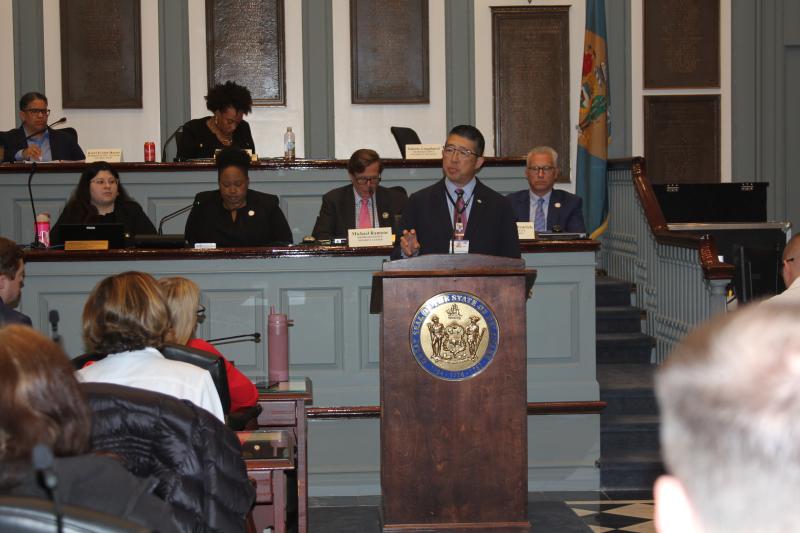-
 play_arrow
play_arrow
Radio Rehoboth
Speaking at Legislative Hall in Dover March 27 about a bill that would create a board to approve hospital budgets, Beebe Healthcare’s Dr. David Tam opened up about his personal health.
The president and CEO of the Cape Region health group said he applauded Speaker of the House Rep. Valerie Longhurst’s Substitute 1 for House Bill 350 to reduce healthcare costs because it is a challenge to provide accessible, quality healthcare while containing costs.
“I say that because I’m here today. I haven’t been in pocket for two weeks because on March 8 I had a stroke,” he said. “Thank God I was near a hospital, my hospital. As a result, I was treated.”
He said his condition had a 90% chance of mortality, and he was flown to Jefferson Hospital in Philadelphia for further care.
“As you can see, I am fit. I’m not someone who is overweight, I don’t smoke, and yet I had a stroke,” said Tam, who appeared fully recovered and showed no signs of suffering a stroke.
Tam said his post-stroke care will continue, and it’s important for everyone to have access to effective healthcare, before he was unceremoniously cut off due to reaching the speaking time limit.
Penny Short, president of TidalHealth Nanticoke in Seaford, said the Sussex County hospital needs to be able to compete with neighboring states for healthcare talent, and competitive pay is part of the package.
“Let’s be real, most physicians aren’t coming out of school saying, ‘Oh, let me go to Seaford, Del., to work,” she said.
The costs of supplies and pharmaceuticals have gone up, she said, which has also put a strain on TidalHealth’s budget. She said she is willing to work with legislators on a solution.
Bayhealth President and CEO Terry Murphy said Bayhealth’s board is made up of volunteer nurses, physicians and 10 community members who understand healthcare issues that face the Kent and Sussex communities.
“From a technology, growth, strategy perspective, they are the ones who know best,” he said.
Murphy said legislators should consider the data they are using to make decisions, especially when comparing Delaware to Vermont’s healthcare benchmark spending system, of which the proposed bill is modeled.
The bill would create the Diamond State Hospital Cost Review Board, which, starting in 2026, would be responsible for review and approval of annual hospital budgets.
According to the bill, hospital budgets would be required to adhere as closely to the spending benchmark as is reasonable given the hospital’s financial position and associated economic factors; promote efficient and economic operations of the hospital; and maintain the hospital’s ability to meet its financial obligations. As a temporary measure until the board begins operations, hospitals would be required to charge no more than 250% of Medicare costs to any payer for hospital services in calendar year 2025.
Longhurst said spending benchmarks are needed to rein in healthcare costs, which account for 42% of Delaware’s budget with no signs of slowing.
“We have no mechanism to meet the targets,” she said.
At his recent State of the State address, Gov. John Carney warned of impending healthcare costs strangling state programs. Healthcare cost inflation in Delaware continues to skyrocket with $2 billion spent on healthcare, an increase of $200 million over last year, he said. Medicaid spending alone was $1 billion.
Longhurst said hospital healthcare spending today is determined by two people – a hospital official and an insurance representative. No one from the state is involved, she said, “but they expect the state to continue to pay.”
Former legislator David Bentz testified that hospitals are a top cost driver in healthcare spending.
“Costs continue to rise faster than gross domestic product costs,” he said.
Longhurst said the bill would bring about a new level of transparency through the board so the public could see where costs are increasing.
Two legislators on the House Administration Committee, which held the bill’s public hearing – House Majority Leader Rep. Melissa Minor Brown, D-New Castle, and House Majority Whip Rep. Kerri Evelyn Harris, D-Dover – said they had heard from dozens of nurses who said they had been told they would lose their jobs if they supported the bill.
“They are in fear of losing their jobs,” Minor Brown said to a packed audience dotted with white coats and nursing scrubs. “You will not lose your job related to the outcome of this bill. So if you’ve been told that by your employer, just know you will not lose your job, and shame on them if you were told that.”
TidalHealth’s Short said that is not the case at her hospital.
“I think you could talk to anyone in our organization and nobody is in fear of losing their job,” she said. “I probably need twice the amount of nurses to work.”
Murphy said in his 15 years at Bayhealth, they have only had a layoff once and that was because of a federal mandate.
“That’s the only time we’ve done a layoff, and like Penny, we’ll take any nurses we can grab in the market,” he said.
Rep. Mike Ramone, R-Newark, made a motion to table the bill, which was voted down, and the bill moved out of committee with Ramone not voting. Rep. Lyndon Yearick, R-Woodside, voted no. Minor Brown, Harris and Longhurst moved to release the bill, which now awaits action by the full House.
Go to Source:https://www.capegazette.com/article/healthcare-heads-speak-out-against-benchmark-spending-bill/272998
Author: Melissa Steele
Written by: RSS
Chart
Top popular

News Briefs 10/17/23
Board of Commissioners Workshop & Special Meeting – November 6

Six Sussex road projects considered in latest CTP
Knicks vs. Cavaliers prediction, odds, line, spread, time: 2023 NBA picks, Nov. 1 best bets from proven model
Tamar Braxton Says ‘Tamar 2.0’ Era Is More ‘Grown Up’ (Exclusive)
Copyright 2023 East Sussex Public Broadcasting, Inc.







